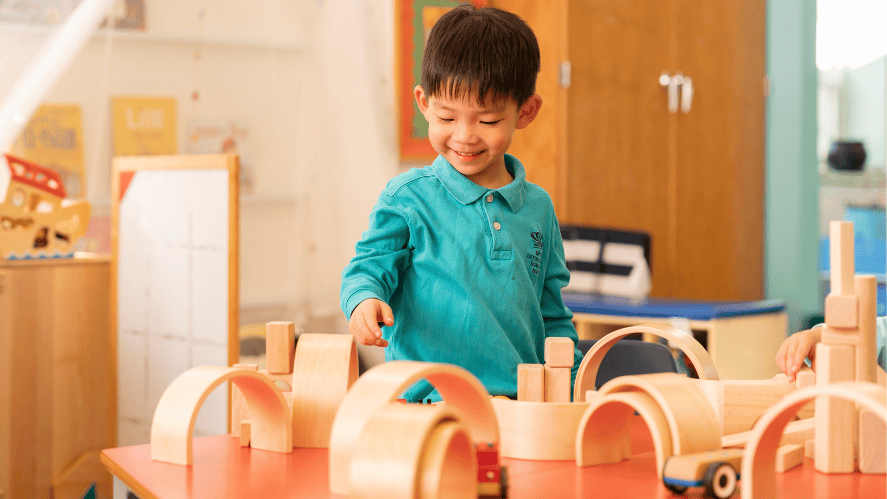We use cookies to improve your online experiences. To learn more and choose your cookies options, please refer to our cookie policy.


As adults, we often cherish our childhood memories, recalling the countless hours spent playing, building forts, climbing trees, or engaging in art and crafts. These playful experiences are more than just fond recollections; they played a critical role in our all-round development. Despite its many benefits, statistics show that the amount of time children get to play has been declining for decades. Tightly structured family schedules, fewer safe places to play and rising screen time are among the reasons.
Play is essential for children as it fosters their confidence and helps them explore, relate to others, set goals, and solve problems. According to the Statutory Framework for the Early Years Foundation Stage (2021), children learn best when they lead their own play, as well as through guided play led by adults.
Research has consistently shown that play is fundamental in developing various skills:
Social Skills: Children learn to cooperate and collaborate, essential for thriving now and in the future.
Emotional Skills: Play helps children understand their feelings and learn emotional regulation.
Cognitive Skills: Engaging in play enhances brain structure and function, promoting executive functions such as problem-solving and goal setting.
Physical Skills: Active play contributes to physical development and coordination.
The American Academy of Pediatrics emphasizes that "play is not frivolous," but rather a vital component in enhancing children's learning processes. Through play, children learn about themselves and the world around them, allowing them to think creatively and take healthy risks.
Play allows children to:
Consider a simple activity such as playing with wooden blocks. While it may seem straightforward, it offers a myriad of possibilities. Your child might construct a castle, a rocket, or a zoo, all of which require logical thinking, spatial awareness, and problem-solving skills. Such activities open discussions about shapes, sizes, and even the principles of stability in structures, fostering scientific reasoning and an introduction to cause and effect, when their structure inevitably falls.
Play can be loud or quiet, active or passive and individual or group based. Understanding the varying levels of adult involvement and the different stagesof play can help you support your child’s development effectively.
Free Play: Fully child-initiated and sustained activities that allow for creative exploration.
Guided Play: Involves some adult involvement while still allowing the child to lead.
Adult-Led Play: Clearly structured activities directed by adults.
Children benefit from engaging in different types of play, whether alone, with peers, or with adults. Playing together fosters strong relationships and helps you to see your child as the capable and creative individual they are!
As the most important person in your child's life, there are numerous ways you can support and extend your child’s play experiences:
Engage During Play: Actively participate in your child’s play. Show that you fully present by valuing their decisions and ideas. Echo back what they said to show you are listening and work with them to build upon their ideas.
Use Positive Body Language: Maintain eye contact, face your child, and engage at their level to create a supportive environment.
Encourage Rich Conversations: Use open-ended questions and comments to promote vocabulary development and deeper thinking. For example, ask, "What do you think will happen if...?" or "I wonder how we could make this stronger?"
Foster Independence and Resilience: Encourage your child to try tasks on their own before offering help. Say things like, "Why don’t you give it a go first, and I’m here if you need help?". Encourage and praise them during the process including their effort rather than the final product.
Know When to Step Back: Recognize when to let your child take charge of their play, allowing them the freedom to explore and make decisions. Over-reliance on adult guided or heavily structured activities stifles their creativity and problem-solving skills.
In conclusion, play is a vital element in your child's growth and development. By supporting their play experiences, you provide opportunities for them to learn essential skills that will benefit them throughout their lives. Embrace the power of playand watch your child flourish!
If you would like any further reading on the importance of play, please check out the webpages below:
https://childdevelopmentinfo.com/child-development/play-work-of-children/pl4/
https://www.unicef.org/parenting/child-care/what-is-free-play
https://empoweredparents.co/types-of-play/
https://www.healthychildren.org/English/family-life/power-of-play/Pages/default.aspx
https://publications.aap.org/pediatrics/article/142/3/e20182058/38649/The-Power-of-Play-A-Pediatric-Role-in-Enhancing?autologincheck=redirected
https://www.naeyc.org/resources/pubs/tyc/aug2018/backpack/things-every-parent-know-play